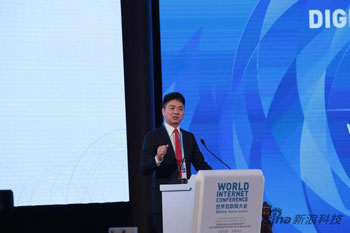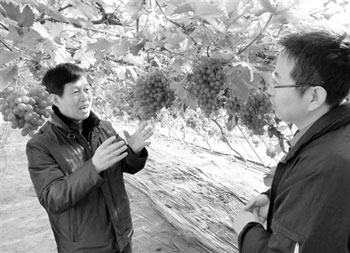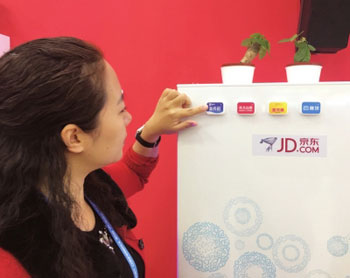Internet + bluestone grinds tofu Liu Qiangdong opens the way by drone
Liu Qiangdong: I haven't eaten my hometown tofu since I came to Beijing.

Liu Qiangdong, founder and CEO of JD.com Group (photo)
On the afternoon of December 17th, the World Internet Conference continued to be held in Wuzhen today. Liu Qiangdong, founder and CEO of JD.com Group, delivered a keynote speech at the "Digital China-Wuzhen Road" forum. Liu Qiangdong said that since coming to Beijing, he has not eaten tofu in his hometown again, so JD.com will take two years to build his own cold chain logistics and distribution network.
Liu Qiangdong said that when I was a child, the happiest thing was to grind tofu at home with children. "I have been in the countryside for 18 years, and since I came to Beijing, I have always wanted to eat bluestone ground tofu from Suqian, Jiangsu Province." According to Liu Qiangdong, after that, he went back to his hometown, because of industrial production, no one used bluestone to grind tofu, so he never tasted the taste of that year again.
Liu Qiangdong believes that in the past, the things produced by farmers themselves could not be sold, and the net profit of selling locally was low, which led to the disappearance of agricultural products such as bluestone grinding tofu. He revealed that JD.com 's third logistics network, the cold chain, warehousing and distribution network, will be completed by the end of next year, hoping to help rural areas build their own brands.
"cooperate with farmers across the country to buy them soybeans, bluestone mills and even small donkeys to grind them, and send the ground tofu to the cities with drones or JD.com." Liu Qiangdong said that not only tofu is the same, but in the future, consumers' demand for bean sprouts will be collected in the city one day in advance and distributed in the form of tofu.
The following is a transcript of Liu Qiangdong's speech:
Good afternoon, ladies and gentlemen.
Next I'll spend eight minutes talking about bread and tofu. What I would like to share with you today is JD.com 's "Internet +" strategy and "one village, one product". A few years ago, I was studying abroad with a group of classmates from Central Europe in the UK. In the evening, a classmate introduced that there is a bread shop next to our hotel. This bakery has a history of 600 years. The bread is very delicious and the price is a little expensive. As a result, several people went at more than 4 o'clock in the afternoon, and they said, "No." The bread in this shop is basically sold out at 10:00 or 11:00 in the morning. Since it sells so well and bread is so expensive, why not increase your production and open five hundred and 1000 stores in London? With such doubts, I went to find the family the next morning. It has been the 12th generation and has been making noodles in London for hundreds of years. They are all dug underground, just like our caves. After talking for a long time, I understand that once this output is expanded, there will be some problems. I have lived in the countryside for 18 years and went to Beijing. For many years, I have been thinking about the tofu ground with bluestone in Suqian, Jiangsu Province. The happiest thing in the Spring Festival when I was a child was pushing the mill. Every time when brewing tofu, the children are very happy, competing to push the big stone mill, because tofu dregs are delicious, tofu is really delicious. I haven't eaten such delicious tofu since I left the countryside for Beijing.
Once I went back to the village and my neighbor invited me to dinner. He asked me what I like to eat, and I said: fried bean curd with sharp pepper. As a result, it was served and it didn't taste right. "with better living conditions in the countryside, tofu is bought from the town, not self-ground tofu, large-scale industrial production," he said. " Since JD.com proposed that the channel sinks, we have spread logistics into the village. In the past, we have covered all the first-and third-tier cities in China. In June this year, when we entered the 150,000 village, each village had a delivery worker for JD.com. Through a large number of communication, we found that it had a very good way to lift farmers out of poverty, to enable rural people to live a good life, and to solve the problem of food safety for urban people. That is, in the past, there were two unfair prices in rural and urban areas: the first is unfair. For a long time, in poorer, backward and poorer parts of China, the higher the price of industrial products sold in the past. For the same home appliances, you can see that the price is much higher than that in Beijing and Shanghai. This is an unfair price. Farmers finally make some money and have some money to buy things. as a result, the price is 20% higher than that of Beijingers and Shanghainese. The second unfair price is that the prices of things produced by farmers themselves have been unable to sell, that is, the cost is very high, the price is very low, and the net profit is very low.
When I went to Shaanxi the other day, I saw a chicken raised by farmers in a village with no money for feed. More than a dozen chickens are left at home to find worms to eat, at no cost. I asked: how much is this chicken in town? Tell me, about 30 yuan-40 yuan per person. I said: try some random ones on our website and sell them for 128 yuan each. Hundreds of chickens a day were robbed. In the past, it could not be sold locally in the city and could not be reversed, so it finally led to the chickens that had been laboriously fed for a year or two, but in the end, after removing all kinds of costs, they found that they could not make any money, which was a very important reason for rural poverty. Based on this, our entire Internet + rural strategy, playing "one village, one product" is natural and mature, and we hope to establish the third logistics network of JD.com Company in China by the end of next year. Two networks have been built in the past decade: 1. Logistics network of large household appliances. Our entire household appliances, refrigerators and color TV sets can be sent to 42 villages in China. The year before last, we began to build the "JD.com gang" service system, for the first time, no matter how poor and backward places are, whatever you enjoy is the same as Beijing. two。 Small and medium-sized parts logistics network. It now covers 98% of JD.com Mall, and 98% of daily orders are sent to thousands of households through self-operated logistics. The third network is the integrated network of cold chain, warehousing and distribution. So far, no company has been able to build a nationwide cold chain and distribution network in China. So we are going to spend two years to build this network, and finally hope that through the way of quality and brand, we can turn the really good things in rural areas into a brand and rely on the brand to realize the premium for farmers. at the same time, it also solves the problem of food safety for urban people.
I hope that one day, all the city people here can be guaranteed to eat bluestone tofu if they want to buy tofu at home every day. Why? We hope to find some rural farmers who can give you soybeans, buy big bluestone mills, or even lend you a loan to buy a small donkey to help you push the mill, and you can use JD.com 's drone to send your tofu to the city in 15-30 minutes in the morning. Then use the efficient and fast distribution network in JD.com city to distribute to thousands of households. The same is true of bean sprouts. We collected the demand of urban consumers for bean sprouts the day before, and then sent them to the farmers who planted bean sprouts. According to JD.com 's request, I can guarantee that the sales price can reach 2-3 times. Thank you!
- Prev

Internet + Agriculture rescues Beijing to build Wisdom soil and Fertilizer
Internet + Agriculture rescues Beijing to build Wisdom soil and Fertilizer
- Next

Taobao shops in rural areas share the light of the Internet in poor villages
Taobao shops in rural areas share the light of the Internet in poor villages
Related
- A course of planting techniques and methods on how to grow carrots
- How to plant the latest tulips?
- Is it better to pick tea in the morning or in the afternoon? When is the best time for tea to be picked? what is the third or fifth tea?
- Launch Yuanxiao Happy combination Haocha + Tea Yuan healthy Taste
- Penghu Tourism "Fireworks 20 Parade with You"
- 2022 West Lake Happiness holds "Digital Revitalization Voucher" and draws iphone13 and laptop.
- Banqiao Fuzhou social houses are designed to change start-up combined with police elimination to create a safe and livable environment
- The convenient measure of "mechanical weeding" in Xinbei has been abused and the Agriculture Bureau has imposed heavy penalties on the illegal land consolidation.
- Changgeng University Joins Hands with Four Memory Factories to Rescue Memory Talent Shortage
- The list of Taiwan's top 100 MVP managers is listed by the Director-General of the Farmers' Association of Sanxia District.

